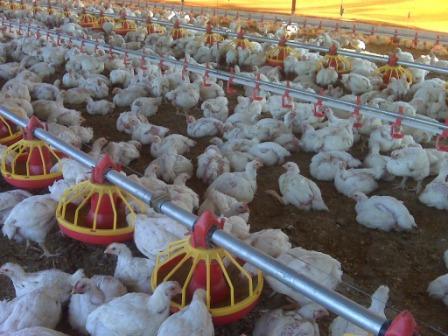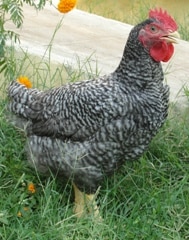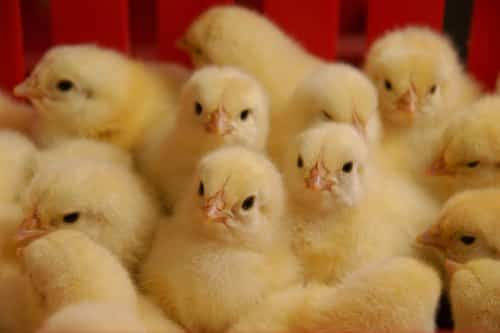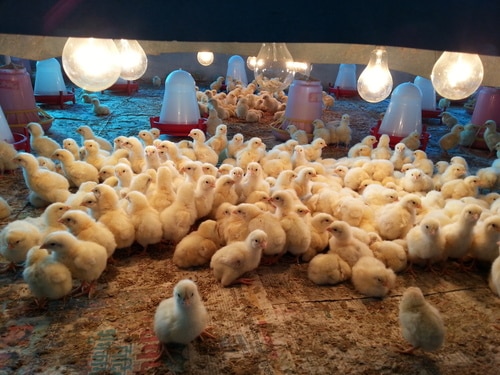Broiler Farming (Poultry) Detailed Guide:-

Introduction of Broiler chicken:- What is broiler? It’s a tender meat young chicken of male or female that grows from a hatch weight of 40 grams to a weight over approximately around 1.5 kg to 2 kg in about 6 weeks time period only. Broilers today has emerged as the one of the fastest growing poultry segment with the increased acceptance of broiler chicken meat in cities, towns, and villages, the demand and consumption of broiler chicken is increasing day by day in a fast pace. In India, during the last few years, poultry farming has taken a U- turn from a backyard venture into a fastest growing commercial sector. For achieving better profits from poultry industry, One should be aware and have good knowledge on its technicality viz: housing, breed, feed management, and over all maintenance.
Broilers breeds reared for meat purpose are: a) Commercial Broiler breeds b) Dual purpose Broiler breeds.
1. Commercial Broiler breeds in India.
- Caribro.
- Babcobb.
- Krishibro.
- Colour broiler.
- Hy-Bro.
- Vencobb.
2. Dual purpose Broiler breeds.
- Kuroiler Dual.
- Rhode Island.
- Red Vanaraja.
- Grama Priya.

Housing/Shed & Management in Broiler farming:- To achieve optimum chick growth and body weight gain in broiler farming, It is essential to provide comfortable and growth specific housing or shed area for birds.
One should consider the following factors or parameters for better Broiler housing and management.Housing/Shed design and site selection are major factors to be considered.
Selecting the Site for Broiler farming:-
- Should have sufficient land area.
- Should have good water supply and electricity.
- Preferably higher land should be considered to avoid water logging in rainy season.
- Better to have road connectivity and transport facility.
- Should be far from human activities and housing estates.
- Should have market access to procure any farm inputs and selling of farm produces.
Housing /Shed Design in Broiler farming:-
- Housing should have good ventilation and wind flow.
- In deep litter system, space requirement is 1 sq ft / bird.
- Should consider East-West as length-wise direction of the shed.

Housing or Shed System:- Try to make housing at low cost, so that saved amount can be used for bird purchase or feed or any other farm inputs. For building a low cost housing system, use locally available material like mud, bamboo, thatch roof/chitra etc. Management is the important part of the broiler farming to achieve desired meat production. Following are the vital parameters to be considered in Broiler management System.
1) Broiler breed selection: Day-old chicks with good quality should be selected.
2) Preparation housing before arrival of chicks:
- Remove the previously used litters and wash the house equipments properly.
- Should spray sanitizers on litter and entire poultry house.
- Should spray selected disinfectants.
- Should clean water pipelines.
- Should consider fumigation of poultry house with suitable agents.

3) Brooding:
- Should start brooder 1 day prior to arrival of chicks to the farm.
- Should adjust the hover temperature to 95 °F at first week and reduce by 5 °F every week until 70 °F.
- Should Place chick guard for first week.

4) Ventilation: The shed /house should be designed with cross ventilation for allowing fresh air to circulate inside the house by providing wire mesh net on two opposite sides of the shed.
5) Lighting: Continuous lighting should be provided from day old to till marketing of chicks.
6) Floor space requirement in the shed: 1 sq ft / bird.
7) Deep Litter Management in Broiler farming:
- Litter materials used in the shed should be either rice husk, saw dust, or chopped wheat straw etc depending upon availability of the material.
- Should remove old litter and use fresh litter for rearing pullets and new batches of
- To avoid caking of litter due to high moisture level in the shed, stirring litter should be carried out on regular basis and humidity of the shed should be maintained.
Poultry Feed Management:- As feed plays vital role in poultry farming and is the major cost of poultry production which seriously affects the production output of the birds. So the feed and feeding management is the major important consideration for efficient commercial poultry farming. Improper feeding causes several deficiency disease which results in poor production performance.
Also, make sure the feed have all the required nutrients (carbohydrates, fats, protein, minerals & vitamins) in right proportion for better growth of the birds. In addition to the regular nutrients, some additives are required to facilitate digestion and growth and is usually added in reputed commercial feed.
Types of Poultry Feed:-
| Age of chicks | Feed Type |
| 0 – 10 days | Pre-Starter |
| 11 – 21 days | Starter |
| 22 days – Till marketing | Finisher |
Estimated Feed consumption of Broiler farming:-
| Chicks age in days | Feed Weight in grams | Body Weight gain/day | ||
| 1st day 2nd day 3rd day4th day 5th day 6th day 7th day 8th day 9th day 10th day 11th day 12th day 13th day 14th day 15th day 16th day 17th day 18th day 19th day 20th day 21st day 22nd day 23rd day 24th day 25th day 26th day
|
20gm/bird/day 22gm/bird/day 24gm/bird/day26gm/bird/day
28gm/bird/day 30gm/bird/day 32gm/bird/day 34gm/bird/day 36gm/bird/day 38gm/bird/day 40gm/bird/day 42gm/bird/day 44gm/bird/day 46gm/bird/day 48gm/bird/day 50gm/bird/day 52gm/bird/day 54gm/bird/day 54gm/bird/day 56gm/bird/day 58gm/bird/day 60gm/bird/day 62gm/bird/day 64gm/bird/day 66gm/bird/day 68gm/bird/day
|
45 – 55 gms 55 – 95 gms 95 – 135 gms135 – 175 gms
175 – 215 gms 215 – 255 gms 255 – 295 gms 295 – 335 gms 335 – 385 gms 385 – 425 gms 425 – 465 gms 465 – 505 gms 505 – 545 gms 545 – 585 gms 585 – 625 gms 625 – 665 gms 665 – 705 gms 705 – 745 gms 745 – 785 gms 785 – 825 gms 825 – 865 gms 865 – 905 gms 905 – 945 gms 945 – 985 gms 985 – 1,025 gms 1,025 – 1,045 gms
|
||
Application of Effective Micro-Organism Liquid (E.M.) in Broiler farming:

What is E.M? E.M. Is a brown colour concentrated liquid produced from the cultivation of 80 strains of beneficial microorganisms collected from natural environment of India.
What are the advantages of E.M. Technology in Livestock Production or in Broiler farming ?
- It reduces cost inputs more efficiently and improves gain in body weight.
- It maintains better health condition of chicks.
- It helps Clean shed, less flies, ticks and less disease incidence.
E.M. in Broiler feed on daily basis:-
| Age of birds | E.M. Bokashi |
| 01 – 07 days | 30 gm/ kg feed |
| 08 – 14 days | 20 gm/ kg feed |
| 15 days onwards… | 10 gm/ kg feed |
E.M. Solution as additive in drinking water on daily basis:-
| Age of bird | E.M. Solution |
| 01 – 14 days | 1 ml/ liter of water |
| 15 days onwards | 0.5 ml/ liter of water |
Caution Note: E.M.solution should not be mixed with anti-biotic, disinfectants / chlorinated water.
Diseases, Control and Vaccination schedule in Broiler farming:- CLICK HERE.
Bio-Security Measures in Broiler farming: Bio-security is a method of preventing the spread of disease onto your poultry farm.
Bio-security has 3 major components:
- Isolation.
- Traffic Control.
- Sanitation.
What are the Bio-security Measures in Broiler farming ?
- Should have fencing.
- Should keep visitors to a minimum.
- Should limit visitations to other poultry farms.
- Should keep all animals and wild birds out of poultry sheds.
- Should practice sound rodent and pest control programs.
- Must inspect bird flocks daily and recognize disease symptoms.
- Should have good ventilation and relatively dry litter.
- Should keep areas around sheds and feed bins clean.
- Never go for exchange of feed and equipments.
- Disinfection and sanitization of poultry sheds & equipment should be carried frequently.
- Dead birds must be disposed properly.
Marketing of Broiler Chicks:- Marketing should be planned in advance of starting a farm. A successful farming will depend on the good poultry market and the price offered. In India, consumption of chicken will be less on certain festival times.

Want to do broiler farming in Punjab.
For Broiler Farming / Poultry Information : Read here.
I am interested for Boiler farming (Chicken and Egg). I want do boiler farming in Arwal, Bihar. Can you guide me.
Here is the link for complete poultry information for beginners: Read here.
where we get em solution?
You can order online.
For EM solution and EM based compost preparation: Read Here.
Hi,
I want know about broiler farms. I am instrasting to start broiler farms. Can you please guide me and give me more ideas?
Pl advice me a complete book on broiler farming.
Is there any institute who conduct short term course for poultry farmer.
Waiting for your early response.
For Poultry training, contact , Poultry Department of Animal Husbandry of your state or Central Poultry Development Organisation.
Dear
I am planning to start a poultry farm (small scale to start with) in surrounding areas Kanyakumari district near by Nagercoil. I have no idea about this business. I have following queries, looking for some guidance/advice from the members for the Prerequisites before start a poultry farm Tamilnadu.
1. Is there any government rules/regulations to set up poultry farm.
2. What type of permits or approvals needed before starting the poultry farm.
3. What are the pre-requisites (an area we choose, surrounding environment) we have to consider while selecting the farm location.
Any other suggestions on requirements on this subject are most welcome.
Awaiting for your prompt reply.
Thanks
Rajesh.
Here has requested information: Broiler Farming Project Report.
Dear sir…
I m working as junior engineer. But i like to make money. So i would like to start boiler farm. I want total amount for boiler farm for 3000 bird capacity. Plz provide details and suggestions sir..
Thank you
You can read this: Broiler Chicken Farming Project Report.
I have 22500 sq.ft. (20 gunnta) farm land at Neral i.e. 4 km from Neral East Station in Karjat Dist. I have to start 5000 birds poultry farm in my farm. This farm land having fencing with gate and borewell. So request you to guide me how to find market or bulk buyer for this project. Also please send me complete project document for bank loan. I will pay your project making charges and share your contact no. at my email id.
Hi. I want to sell 10,000 broilers per month, how many broiler sheds do I need to reach 10,000 supply per month.
You can build 1 or 10. You can build multi stored poultry shed in case of land problem.
Hi,
I am Planning to start a Poultry Farm at my Native Place Saoner, Distt. Nagpur. I have no ideas regarding this business. So Kindly Request to Help & suggest about this business to start.
thanks
Please go through this information to understand the poultry business plan. Read: How To Start A Poulry Business.
Hi ,Am planning to start broiler poulry farming in my native near by Tirunelveli in Tamilnadu. Can you please guide me is there any Goverment subsidey available for bank loans and how to apply .
Hi
Sir
Want to do broiler farming in Gujarat
Some help pls
Sir , I want start Poultry Farm business. I want to get bank loan. But , any bank can provide financial assistance without any security. If any chance is there, please give me the details/ link. It’s very use6for more Enterpenuers to start. Thank you
Is there a medicine injection(chemicle) for instant fat for broiler chickens?
Thanks very much sir o give me this important information actully i newly join work in poultry farming and i have no idea about this all thanks alot…………..
hai ,
i like to start broiler forming in my native so i need buy back dealership can you able to help me or give some contacts in Salem district.
Hi there,
I wanted to start a boiler farm with 2500/3000 chicks capacity in Hyderabad
Can you help me out with Business plan, Poultry manual and any other information which you feel will be valuable to me and enlighten us with newly developed feed with less chemicals involved.
Thanks
SK
How to find the buyers (live birds)
Main yah kam karna chahta hun kripya sahayata Karen